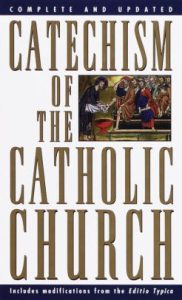CLICK HERE for the details from the Catechism of the Catholic Church on Holiness

True Holiness is for Everyone
CCC 2013: “All Christians in any state or walk of life are called to the fullness of Christian life and to the perfection of charity.” All are called to holiness: “Be perfect, as your heavenly Father is perfect.”
In order to reach this perfection the faithful should use the strength dealt out to them by Christ’s gift, so that . . . doing the will of the Father in everything, they may wholeheartedly devote themselves to the glory of God and to the service of their neighbor. Thus the holiness of the People of God will grow in fruitful abundance, as is clearly shown in the history of the Church through the lives of so many saints.
Holiness Comes Through Christ and is Gift
CCC 2014: Spiritual progress tends toward ever more intimate union with Christ. This union is called “mystical” because it participates in the mystery of Christ through the sacraments – “the holy mysteries” – and, in him, in the mystery of the Holy Trinity. God calls us all to this intimate union with him, even if the special graces or extraordinary signs of this mystical life are granted only to some for the sake of manifesting the gratuitous gift given to all.
The Cross is the School of Holiness: Holiness Requires Asceticism
CCC 2015: The way of perfection passes by way of the Cross. There is no holiness without renunciation and spiritual battle. Spiritual progress entails the ascesis and mortification that gradually lead to living in the peace and joy of the Beatitudes:
He who climbs never stops going from beginning to beginning, through beginnings that have no end. He never stops desiring what he already knows.
Love (Charity) is the Way of Holiness for all in the Church
CCC 826: Charity is the soul of the holiness to which all are called: it “governs, shapes, and perfects all the means of sanctification.”
If the Church was a body composed of different members, it couldn’t lack the noblest of all; it must have a Heart, and a Heart BURNING WITH LOVE. And I realized that this love alone was the true motive force which enabled the other members of the Church to act; if it ceased to function, the Apostles would forget to preach the gospel, the Martyrs would refuse to shed their blood. LOVE, IN FACT, IS THE VOCATION WHICH INCLUDES ALL OTHERS; IT’S A UNIVERSE OF ITS OWN, COMPRISING ALL TIME AND SPACE – IT’S ETERNAL! 298 (Cf. St. Therese of Lisieux)
Our Holiness Affects the Entire Body of Christ
CCC 2045: Because they are members of the Body whose Head is Christ, Christians contribute to building up the Church by the constancy of their convictions and their moral lives. The Church increases, grows, and develops through the holiness of her faithful, until “we all attain to the unity of the faith and of the knowledge of the Son of God, to mature manhood, to the measure of the stature of the fullness of Christ.”
Holiness for Each One of Us Has No Limit
CCC 2028: “All Christians . . . are called to the fullness of Christian life and to the perfection of charity” (LG 40 § 2). “Christian perfection has but one limit, that of having none” (St. Gregory of Nyssa, De vita Mos.:PG 44, 300D).
Holiness Depends on Prayer
CCC 2814: The sanctification of his name among the nations depends inseparably on our life and our prayer:
We ask God to hallow his name, which by its own holiness saves and makes holy all creation . . . . It is this name that gives salvation to a lost world. But we ask that this name of God should be hallowed in us through our actions. For God’s name is blessed when we live well, but is blasphemed when we live wickedly. As the Apostle says: “The name of God is blasphemed among the Gentiles because of you.” We ask then that, just as the name of God is holy, so we may obtain his holiness in our souls.
When we say “hallowed be thy name,” we ask that it should be hallowed in us, who are in him; but also in others whom God’s grace still awaits, that we may obey the precept that obliges us to pray for everyone, even our enemies. That is why we do not say expressly “hallowed be thy name ‘in us,”‘ for we ask that it be so in all men.






